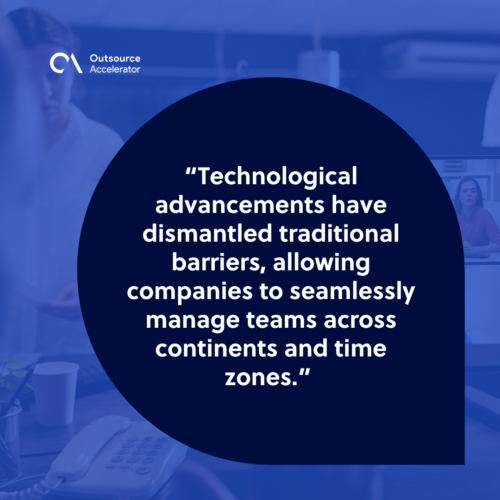Exploring the benefits of global employment

When it comes to hiring, businesses are no longer restricted by geographic location. The emergence of digital platforms, remote work technologies, and the desire for diverse talent has spurred a significant shift in employment patterns.
Companies of all sizes are increasingly turning to global employment as a strategy for staying competitive, accessing a broad range of skills, and reducing operational costs.
Tapping into a global workforce allows businesses to achieve remarkable benefits, from increased efficiency to deeper cultural insights.
In the 515th episode of the Outsource Accelerator Podcast, Geoff Hucker, the Founder and CEO of Work for Impact, tells of his experience in connecting with global employment and the benefits he sees.
This article explores the top advantages of adopting a global employment model.
The trend of global employment
Global employment is no longer a trend confined to large multinational corporations. With outsourcing, it’s now accessible to businesses across various sectors and scales.
Technological advancements have dismantled traditional barriers, allowing companies to seamlessly manage teams across continents and time zones.
Cloud-based tools, collaborative software, and secure communication platforms enable businesses to recruit and manage talent from any corner of the world.
Moreover, the rise of remote work due to recent global events has reshaped employee expectations. The prospect of a global workforce is more attractive and viable than ever.
Businesses now see global employment as a way to remain resilient, adaptable, and innovative as the business landscape continues to grow more competitive.

Geoff also views it through a humanitarian lens, allowing more privileged countries to offer opportunities.
“[It’s] using technology to provide global opportunities for young people in low-income countries.”
With today’s existing technology, he asks why shouldn’t global employment be more of a thing?
“[it’s] having all the security, all the infrastructure, so someone can work wherever they are in the world. And also the opportunities for organizations to find global talent and work with them.”
Top 5 benefits of global employment
Embracing global employment opens a wide array of advantages:
1. Access to a wider talent pool
One of the foremost advantages of global employment is the ability to access a vast and diverse talent pool. Recruiting from a global market means companies can hire the best candidate for the role, regardless of location.
For specialized positions where local talent may be in short supply, this is especially advantageous.
For instance, tech companies can recruit skilled software developers from regions known for technological expertise. IT education and skills are rapidly advancing in places like Eastern Europe or Southeast Asia.
A global talent pool can let companies diversify their team in ways that promote innovation and creativity. Employees from various backgrounds bring unique perspectives, which can lead to more dynamic problem-solving and idea generation.
In essence, a global workforce strengthens a company’s ability to innovate and adapt to new challenges.
2. Cost savings and increased efficiency
Hiring globally can also lead to significant cost savings. Wage expectations vary greatly across different countries, and companies can often find highly skilled professionals in regions with lower labor costs.
Additionally, a global workforce enables companies to operate more efficiently across multiple time zones.
For example, a customer support team distributed globally can provide 24/7 support, improving the customer experience without requiring night shifts or overtime.
Because living standards are lower in these countries, they still earn a good rate.
“The talent tends to earn two or three times what they would through traditional outsourcing.” Geoff says.
3. Enhanced flexibility and agility
The ability to adjust team size and composition quickly is another benefit of global employment. Scaling a workforce in response to fluctuating demands becomes easier when hiring globally.
Companies can employ flexible workers or engage freelancers from various countries, adjusting team size and skill sets as needed.
This flexibility enables businesses to remain agile and responsive, two critical traits in today’s fast-changing markets. During peak periods, such as holiday seasons or product launches, companies can ramp up resources by hiring additional talent from a global pool.
This ensures they have the support needed to handle increased workloads and maintain high performance levels.
4. In-depth market insights and cultural understanding
Global employment allows companies to gain insights into regional markets through local team members. Local employees provide valuable perspectives on customer preferences, cultural nuances, and industry trends in their regions.
This knowledge can be instrumental in shaping marketing strategies, product designs, and service offerings tailored to different target markets.
Having employees in different countries also strengthens brand presence in those regions. This allows companies to build relationships with local stakeholders and customers.
Geoff touts this as an advantage of Work for Impact.
“We have a very good understanding of the market of each country, of what works well, of what doesn’t work well, the infrastructure in each country, which is a very big consideration.”

5. Improved employee satisfaction and retention
Global employment often supports remote work and flexible schedules, both of which contribute to a positive work-life balance for employees.
Many professionals appreciate the flexibility to work from home or set their hours. Companies that offer this flexibility are often seen as desirable employers.
Moreover, global employment expands career opportunities, making companies attractive to top talent worldwide. When employees feel their company is progressive and accommodating, they are more likely to be engaged, satisfied, and loyal.
Geoff says that their model allows him to meet amazing employees.
“One of the many great things about running Work for Impact is that I get to meet wonderful people from all around the world and just seeing how outsourcing work for impact has fundamentally changed their lives. And there’s many, many examples.”
Consider a global workforce for business growth
Incorporating a global workforce into a business model can propel companies towards long-term growth and success.
The global employment landscape continues to evolve. Businesses that adapt to these trends gain a competitive edge by accessing diverse talent, controlling costs, and enhancing their flexibility.
A global workforce also opens doors to new markets and opportunities that may not be feasible with a strictly local team.
By expanding their hiring practices beyond traditional borders, companies stand to achieve a wealth of benefits. Embracing global employment is not just a strategy for reducing costs; it’s a pathway for businesses to remain resilient, inclusive, and innovative.







 Independent
Independent




